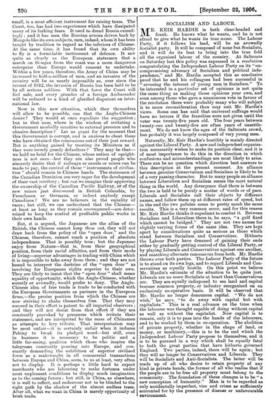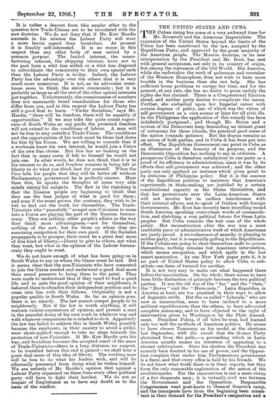SOCIALISM AND LABOUR.
MR. KEIR HARDIE is both clear-headed and frank. He knows what he wants, and he is not afraid to give what he wants its true name. The Labour Party, if it follows his lead, will be an avowedly Socialist party. It will be composed of none but Socialists, and it will do its best to bring into the true fold all the organised labour of the country. At Saltcoats on Saturday last this policy was expressed in a resolution congratulating the Independent Labour Party on its "un- compromising advocacy of Socialism and political inde- pendence," and Mr. Hardie accepted this as conclusive proof that he and. his colleagues had been successful in "arousing the interest of young men in Socialism." To be interested in a, particular set of opinions is not quite the same thing as making those opinions your own, aud even among those who gave a unanimous vote in favour of the resolution there were probably many who will subject it to more reconsideration than may suit Mr. Hardie's views. Some one has said that universal suffrage would. have no terrors if the franchise were not given until the voter was twenty-five years old. The four years between twenty-one and twenty-five are often years of unsettle- ment. We do not know the ages of the Saltcoats crowd, but probably it was largely composed of very young men.
Naturally, Mr. Keir Hardie's hostility is mainly directed against the Liberal Party. A new and independent organisa- tion necessarily wishes to make its position clear, and it is of most importance to do this in the direction in which confusions and misunderstandings are most likely to arise. There can be no question which direction best answers to this description at the present moment. An alliance between genuine Conservatism and Socialism is likely to be of a very passing character. But to many people an alliance between Liberalism and. Socialism seems the most natural thing in the world. Any divergence that there is between the two is held to be purely a matter of words or of pace. Liberals and Socialists call their objects by different names, and follow them up at different rates of speed, but in the end the two policies come to pretty much the same results. This is a very common error, and for this reason Mr. Keir Hardie thinks it expedient to combat it. Between Socialism and Liberalism there is, he says, "a gulf fixed which cannot be bridged." They are not two names for slightly varying forms of the same idea. They are kept apart by considerations quite as serious as those which stand between Socialism and. Conservatism. Hitherto the Labour Party have dreamed of gaining their ends either by gradually getting control of the Liberal Party, or by playing Liberals and Conservatives against one another, and snatching alternate concessions from both. Mr. Hardie throws over both parties. The Labour Party of the future is to stand. on its own legs, and to regard Liberals and Con- servatives as equally hostile. On this point we believe Mr. Hardie's estimate of the situation to be quite just. Liberals are no more Socialists at heart than Conservatives are. They are equally indisposed to see land and. capital become common property, or industry reorganised on an exclusively co-operative basis. It will be observed that Mr. Hardie no longer denounces capital. "We do not wish," he says, "to do away with capital but with capitalists." This is a real advance on the time when the labourer was thought capable of doing without capital as well as without the capitalist. Now capital is to remain, only it is to pass into the hands of the labourers, and. to be worked by them in co-operation. The abolition of private property, whether in the shape of land, or money, or machinery,—this is to be the end. which the Independent Labour Party propose to themselves, and it is to be pursued in a way which shall be equally fatal to both the great parties that have hitherto governed England. Two parties, indeed, there will be again; but they will no longer be Conservatives and Liberals. They will be Socialists and. Anti-Socialists. The latter will be made up of all who desire to retain property of any kind in private bands, the former of all who realise that if the people are to be free all property must belong to the community. The foundation of these changes is to be "a new conception of humanity." Man is to be regarded as only accidentally imperfect, vice and crime as sufficiently accounted for by the presence of disease or unfavourable environment. It is rather a descent from this ampler ether to the question how Trade-Unions are to be inoculated with the new doctrine. We do not deny that if Mr. Keit Hardie succeeds in his mission the Labour Party will wear a more heroic aspect than heretofore. At present it is frankly self-interested. It is no worse in this respect than any other body of men united by a common purpose. The landed interest, the manu- facturing interest, the shipping interest, have not in the past been a whit less selfish or a whit less disposed to subordinate the community to their own special ends than the Labour Party is to-day. Indeed, the Labour Party has the advantage over the others that it is very much more numerous. It is not, as its advocates some- times seem to think, the entire community ; but it is probably as large as all the rest of the other special interests put together. Unfortunately, the consciousness of numbers does not necessarily breed consideration for those who differ from you, and in this respect the Labour Party has still a good deal to learn. "Under Socialism," says Mr. Hardie, "there will be freedom, there will be equality of opportunities." If we may take the quite recent experi- ence of South Wales as any guide, the promised freedom will not extend to the conditions of labour. A man will not be free to stay outside a Trade-Union. The conditions and the opportunities of his work must be those laid down for him by his Union. We are willing to concede that if a workman knew his own interest, he would join a Union of his own free choice. But this has no bearing on the fact that in many cases if left to himself he would not join one. In other words, he does not think that it is to his interest to do so, and freedom consists in being left at liberty to do what you think best for yourself. When the. Czar tells his people that they will be better off without Parliamentary government he is perfectly sincere. More than this, he speaks the thoughts of some very able minds among his subjects. The flaw in the reasoning is that the Russian people arc beginning to think that they are the best judges of what is good for them ; and even if the event proves the contrary, they wish to be left to find out the truth for themselves. The Trade- Unionists who "peacefully "compel non-Unionists to come into a Union are playing the part of the Russian bureau- cracy. They are sealing other people's affairs in the way they think most advantageous,—not for themselves, nothing of the sort, but for those on whom they are exercising compulsion for their own good. If the Socialist propaganda is to prosper, there must be a great deal more of this kind of liberty,—liberty to give to others, not what they want, but what in the opinion of the Labour bureau- cracy- they ought to want.
We do not know enough of what has been going on in South Wales to say on whom the blame must be laid. But it seems clear that the non-Unionists who have consented to join the Union needed and underwent a good deal more than moral pressure to bring them to the point. They were made to understand that if they cared to lead a quiet life and to gain the good opinion of their neighbours, it behoved them to abandon their independent position and to come into line with their fellows. Originality is not a popular quality in South Wales. So far as opinion goes, there is no remedy. The law cannot compel people to be neighbourly. But if the law is worth anything, it will restrain violent expressions of opinion, and protect a man in the peaceful doing of his own work in whatever way and with whatever companions he is minded to do it. Apparently the law has failed to achieve this in South Wales, possibly because the employers, in their anxiety to avoid a strike, were short-sighted enough to take no steps towards the protection of non-Unionists. If Mr. Keir Hardie gets his way, and Socialism becomes the accepted creed of the mass of Trade-Unionists—there is a long distance, we suspect, to be travelled before this end is gained—we shall hear a great deal more of this idea of liberty. The working man will be free to do what his leaders wish, and will be effectually prevented, from doing what he wishes himself. We are entirely of Mr. Hardie's opinion that against a Labour Party organised on these lines every other political party will have to fight their hardest. We do not so despair of Englishmen ai to have any doubt as to the issue of the conflict.







































 Previous page
Previous page